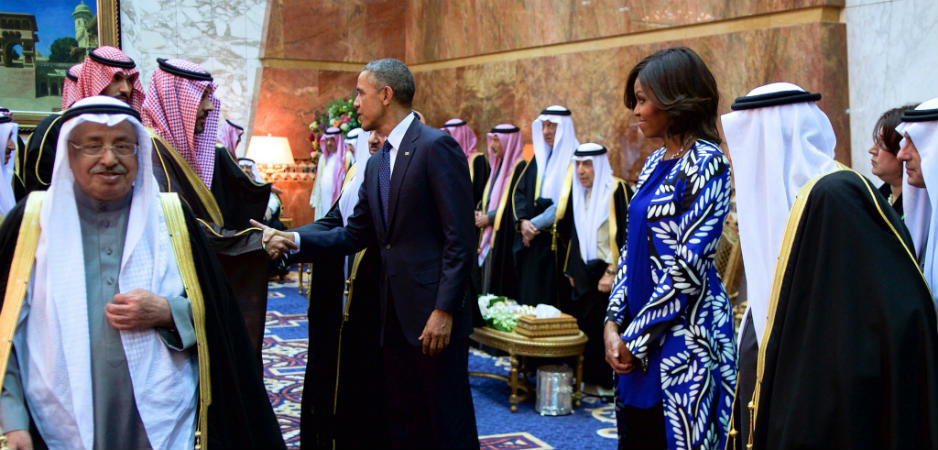The latest move by Saudi Arabia will do little to curb Hezbollah’s actions in Syria.
Saudi Arabia’s decision to ban its citizens from traveling to Lebanon only raises more questions about the kingdom’s foreign policy in the Middle East. The travel ban comes on the heels of previous decisions to cut off aid to Beirut and withdraw deposits with the Lebanese central bank. Riyadh’s move was followed by similar actions from other members of the Gulf Cooperation Council (GCC), including Bahrain, Qatar, Kuwait and the United Arab Emirates.
These actions come at a bad time for the battered Levantine nation. With its population swelled by nearly 25% by Syrian refugees, the concomitant Syrian Civil War on its eastern border raging into its sixth year, and its presidential selection saga still undecided, Lebanon cannot afford to lose either the GCC funds on which it has depended for so long, nor the many Gulf travelers who come to enjoy and generously spend their vacation cash in the famous Mediterranean resort nation.
Saudi Arabia’s decision was ostensibly made because of Lebanon-based Hezbollah’s major role in the Syrian crisis, in which Riyadh and Doha are backing forces opposing the Assad regime’s forces, which are heavily supported by Hezbollah fighters, weapons and intelligence.
But one must ask how depriving Beirut of the GCC’s vital support will hurt Hezbollah or in any way undermine its efforts in Syria. The Lebanese government has no ability to diminish, much less eliminate, Hezbollah’s role in Lebanese politics or policy, or the presence of Hezbollah in southern Lebanon. For the time being, Hezbollah is an established if undesirable feature of Lebanon’s contorted and ill-constructed political system.
One might also conclude that Beirut may end up becoming more dependent on Saudi Arabia’s principal arch-rival for power and influence in the Middle East, Iran. The latter, already heavily entrenched as well in the Syria fighting in support of President Bashar al-Assad, will have no interest in seeing yet another important base for Shia influence in the region made more unstable. But then, neither will Jordan, Egypt or Israel. Nor can the Kingdom of Saudi Arabia, a longtime supporter of the Sunni factions in Lebanon, see instability there as in its interest.
The funding decisions may also have to do with some unfamiliar belt-tightening that is taking place in Saudi Arabia. Oil prices still hang around the $30-dollar mark after an 18-month decline from $100-plus per barrel, and forecasts suggest that it may be until 2017 before oil exporters like Saudi Arabia and the other GCC states see any rebound in those prices.
According to media reports, oil revenue is the single biggest source of government income in Saudi Arabia, at an estimated 90%. The price plummet left a budget deficit of $98 billion in 2015, or about 15% of gross domestic product. The International Monetary Fund is projecting another $87-billion deficit this year, further eroding the kingdom’s once enormous reserves.
So, reducing aid, a familiar budget cutting measure among Western nations, might seem like a logical move for Riyadh.
However, punishing an otherwise Saudi-friendly Lebanon, which also enjoys the support of the US and France among others, would appear to be an unwise tactical move, cutting off one’s nose to spite its face. While perhaps throwing a short-term wrench in Iran’s policy calculations, the move most certainly will not affect its support for Hezbollah or Syria, nor upset Hezbollah’s role in Syria. But it will further weaken Lebanon as it battles to keep afloat on so many fronts: security, economics and domestic politics.
The decisions regarding Lebanon are attributed to King Salman’s young son and deputy crown prince, Mohammed bin Salman. While his intentions to diversify the kingdom’s oil-dependent economy, privatize state enterprises and reduce subsidies are to be lauded, this decision, which most assuredly impacts foreign and security policy, appears unwise if not erratic.
Saudi Arabia and the US
Did Saudi Arabia’s policymaking leadership coordinate this among themselves or with important allies beyond the GCC, such as the US?
The status of relations with the latter is well-known, as Saudi authorities have expressed both privately and even publicly their dissatisfaction with Washington’s policy decisions as they apply to the Middle East—from lackluster support for the moderate opposition in Syria to last year’s P5+1 agreement to limit Iran’s nuclear development program.
That Riyadh did not consult with Washington on its decision over Lebanon would seem all but apparent. Had it done so, the US might have advised other ways to address the Hezbollah question in Lebanon without harming the country. Saudi Arabia’s European allies doubtlessly would have counseled the same.
When considered in light of other decisions emanating from the kingdom since Salman’s assumption of the throne in January 2015—for example, the destructive civil war in Yemen, which shows little evidence of ending; fruitless flailing over what to do in Syria; and pointless antagonizing of a resurgent Iran—one is left to wonder how much more damage to Riyadh’s interests await.
More than anything, however, this latest decision may illustrate the erratic nature of decision-making in a Riyadh untethered to what had been heretofore a core strategic relationship with Washington. Saudi Arabia may be correct in that the US has showed some unsophisticated policymaking in the Middle East, perhaps as a result of having failed to listen closely enough to its key allies like Riyadh.
But the two countries still share a vital core interest: Gulf and regional security and stability. This latest decision would appear to act in contravention to both.
The views expressed in this article are the author’s own and do not necessarily reflect Fair Observer’s editorial policy.
Photo Credit: US Department of State / John Grummitt / Shutterstock.com
 We bring you perspectives from around the world. Help us to inform and educate. Your donation is tax-deductible. Join over 400 people to become a donor or you could choose to be a sponsor.
We bring you perspectives from around the world. Help us to inform and educate. Your donation is tax-deductible. Join over 400 people to become a donor or you could choose to be a sponsor.
Support Fair Observer
We rely on your support for our independence, diversity and quality.
For more than 10 years, Fair Observer has been free, fair and independent. No billionaire owns us, no advertisers control us. We are a reader-supported nonprofit. Unlike many other publications, we keep our content free for readers regardless of where they live or whether they can afford to pay. We have no paywalls and no ads.
In the post-truth era of fake news, echo chambers and filter bubbles, we publish a plurality of perspectives from around the world. Anyone can publish with us, but everyone goes through a rigorous editorial process. So, you get fact-checked, well-reasoned content instead of noise.
We publish 2,500+ voices from 90+ countries. We also conduct education and training programs
on subjects ranging from digital media and journalism to writing and critical thinking. This
doesn’t come cheap. Servers, editors, trainers and web developers cost
money.
Please consider supporting us on a regular basis as a recurring donor or a
sustaining member.
Will you support FO’s journalism?
We rely on your support for our independence, diversity and quality.







